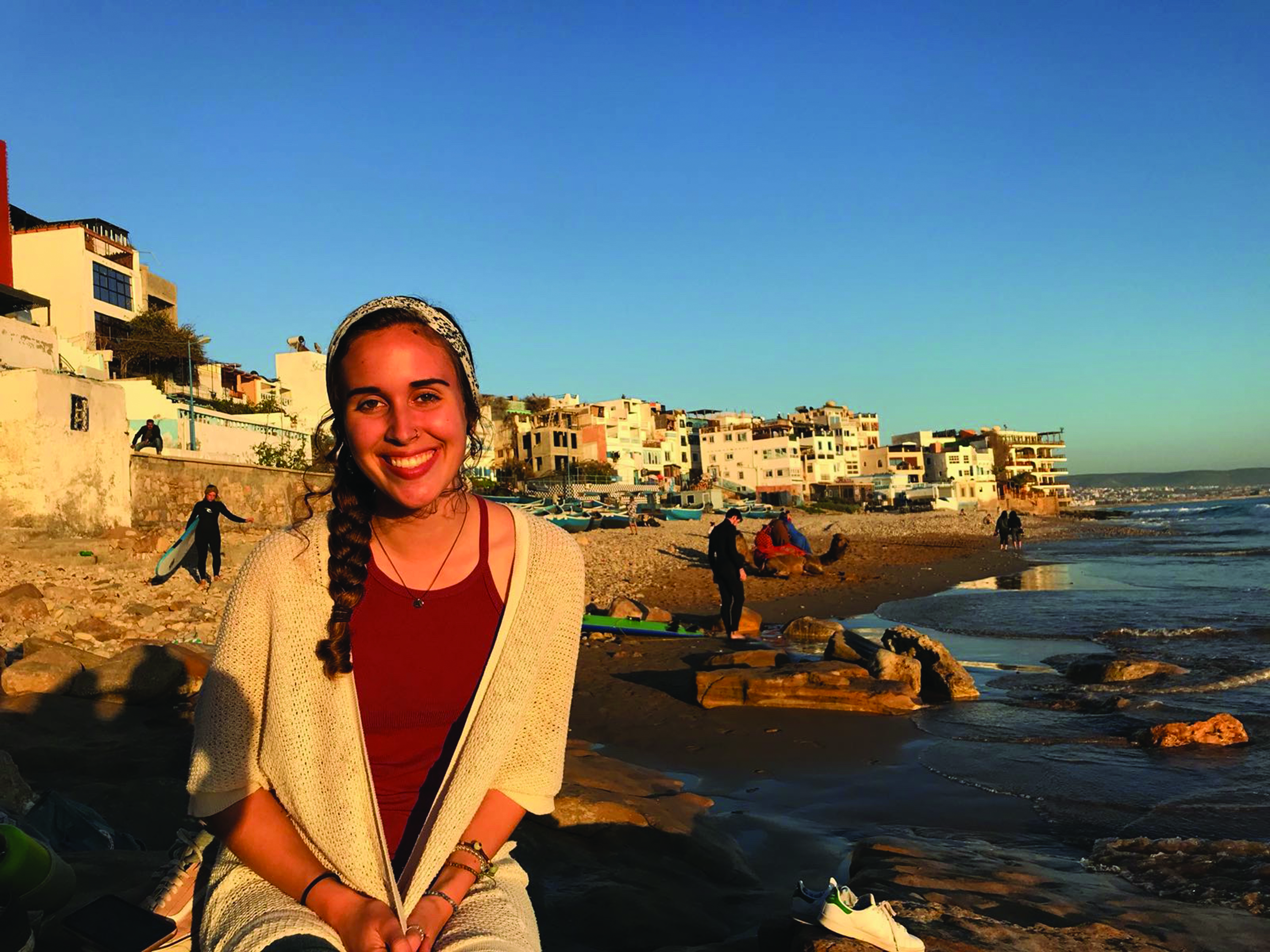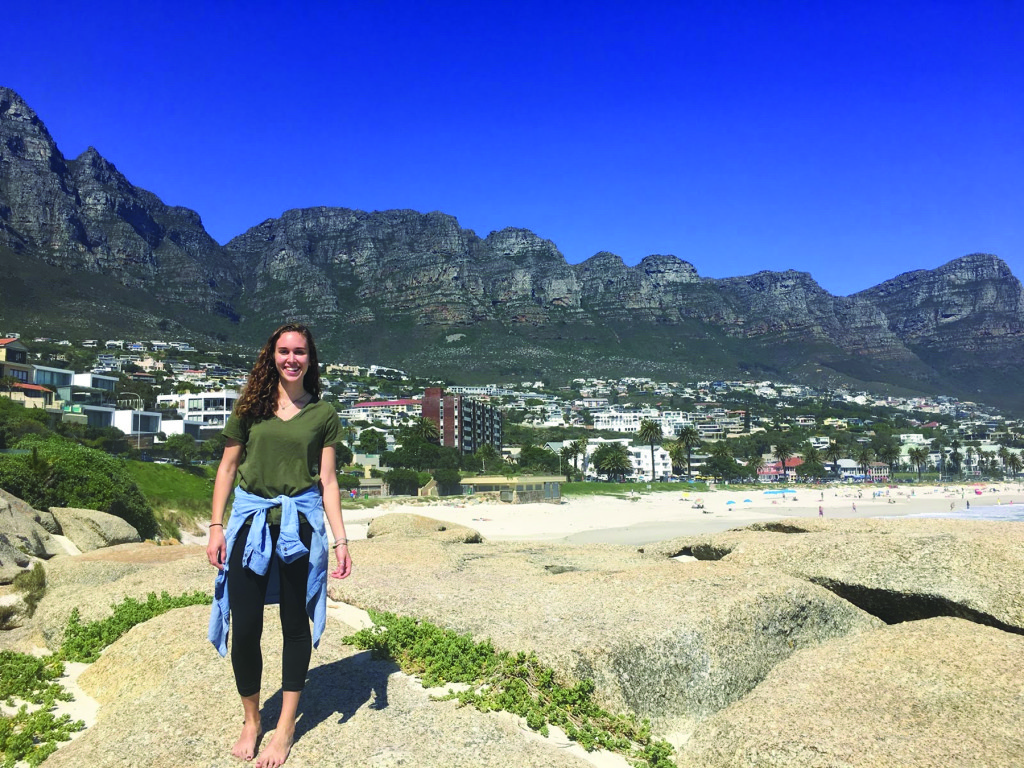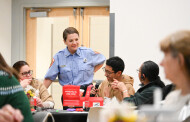Like many of her Apex High School classmates from the Class of 2017, Georgia Morgan toured the University of North Carolina at Chapel Hill and liked what she saw. She was particularly intrigued by their Global Gap Year Fellowship program but at the same time intimidated by the thought of taking a detour between high school and college.
Today, Georgia is a UNC-CH student who has yet to live on campus but with stories unmatched by her classmates after spending her fall semester in South Africa and her spring semester in Morocco.
Becoming A Gapper
Georgia was a senior in the fall of 2016 and already seeing one type of gap year in action when her older brother took some time off after high school to enter the job market. Still, she applied to several universities based on the majors they offered. UNC-CH was her first choice and the only school that offered a gap-year scholarship program, so it seemed the best of both worlds. Her plan was to see which schools wanted her and then decide whether or not to defer acceptance in favor of working or traveling for a year.
She was accepted by UNC-CH and applied for the highly-selective Global Gap Year Fellowship (GGYF). As a program finalist, she spent a weekend on campus meeting other gap year Fellows. “That’s when it became real. When I was awarded the Fellowship, I still had the opportunity to decline and the thought crossed my mind. It was scary. It was a commitment—a signed contract to do six to nine months of service abroad on my own.”
Georgia’s parents, Scott and Michelle, and brothers, Rowan and Aaron, were behind her 100%. “From about the age of five, Georgia seemed much older than her age,” Scott said. “It didn’t surprise me when she started talking about a gap year. I’ve been amazed at her bravery in taking on this experience. I didn’t have the courage to do something like this at 19.”
Michelle likened the opportunity to a “coming-of-age tribal tradition—truly a shamanic journey of going off into the wilderness alone, facing one’s fears, the harsh realities and beautiful synchronicities of life which, in the end, develops character, core strength, a psychological self-knowing and a wider more grounded picture of our complex world.”
After graduation in June 2017, Georgia attended the two-week GGYF Summer Institute and dove headfirst into planning what she called her “grand adventure.” She didn’t know where she wanted to go, but she wanted work that incorporated two themes: human rights and environmentalism.
“[UNC-CH] had the names of organizations previous Fellows had worked with, contact information for professors in certain departments, and a ‘red list’ of places we couldn’t go for political or climate reasons. Other than that, we could go wherever we wanted and it was on us to find an organization to work with.”
Georgia knew of a UNC-CH gapper headed to Cape Town, South Africa, and Googled the city out of curiosity. “It was beautiful,” she said. “I reached out to three or four organizations there and received several responses.” One of those responses was from the Scalabrini Centre of Cape Town, a human rights organization that offers development and welfare programs to help migrants and refugees integrate into South African society. Following an email exchange and Skype interview, Scalabrini welcomed Georgia to their team.
An Uneasy Journey
After arranging flights, securing housing, and confirming a driver to pick her up at the Cape Town airport, the day of departure arrived. Georgia recalls, “The goodbyes were really hard. Once I got to my gate I was fine. I was so optimistic by that point. I just wanted to go.”
As she recounted later in one of her blog posts: “Traveling solo is definitely one of the universe’s biggest ways of teaching people that life will follow its own course of action regardless of one’s plans…and the universe did not waste any time in beginning my lessons!”
Georgia checked her luggage through to Cape Town and flew to Paris for a day-long layover with a friend who lived there. Once back at Charles de Gaulle Airport, she learned that her connecting flight to Johannesburg, South Africa, was delayed 13 hours. The airline arranged for passengers to spend the night in a nearby hotel, but Georgia was worried. “People had been telling me how dangerous Johannesburg was and warned me not to be at the airport at night. Now, I was flying in there at midnight and had a ten-hour delay. I didn’t know what to do.”
A contact in Cape Town helped her reserve a driver and a hotel room and she got on the plane to Johannesburg. When she landed, her bags were still in France and, she says, “At 2am, I was getting into a car with a stranger in South Africa. It was so surreal.”
At the hotel, there was confusion about whether or not Georgia had paid for the room she booked online, and back at the airport a few hours later, the airline agent couldn’t find her flight reservation. After a go-around with a number of customer service representatives, she knew she had to make the plane to Cape Town so she bought a new ticket.
“I got to Cape Town and my driver was there holding a board with my name. I must have looked insane. My luggage came two or three days later.” She admits, “There were a couple times when I just wanted to go home. But it worked out fine. In retrospect, it’s what I wanted. I wanted to be independent and feel like I could handle any situation that came my way. And I handled it the best I could.”
The Scalabrini Centre in South Africa
Georgia’s was an “all-around position” which let her work with different programs offered by the Centre. For the month of September, she helped teach adult English classes and youth leadership and development courses for South African high school students. In October and November, she helped clients from Zimbabwe navigate an online application for renewing permits that allowed them to work, study, or own a business in South Africa. She led or co-facilitated digital literacy courses to teach clients about writing resumes, completing job applications, and using email and Microsoft applications. And she taught basic typing and computer courses for women. “I even covered Reception a couple times, which is deceivingly challenging.”
Georgia lived in Scalabrini housing for a month before renting an apartment, which afforded her more opportunities to explore Cape Town. She took in the breathtaking scenery while hiking and visiting local beaches, and she and her fellow UNC-CH gapper who lived and worked in another part of the city spent time on weekends seeing local sights and even going on a safari.
Dar Si Hmad in Morocco
After a trip home in December, Georgia left for the second half of her gap year, this time in Agadir, Morocco. She lived with a host family and worked for the nonprofit Dar Si Hmad and their RISE program for young adults.
Georgia says, “RISE focuses on global social issues and how they’re manifested in Morocco. We give young people a space in which to freely and safely discuss topics that are traditionally taboo—Identity and Moroccan Stereotypes, Gender in Society, Immigration and Migration, and Freedom of Choice and Expression. Through student-led discussions and activities, they develop skills in public speaking, debating, creative writing, and critical thinking. It’s a refreshing change from lecture-style education that limits creativity and freedom of thought in Morocco.”
She explains that for her role with RISE, “I did curriculum design and planning for the program as well as facilitating and participating, and I conducted an interview and photography project for the ‘Unsung Heroes’ of Dar Si Hmad.”
Upon Reflection
Georgia returned home in mid-April and describes the past year as “the most influential in the 19 years of my life.” However, she finds it overwhelming to answer the question, “How was it?” because, as she says, “There’s no way to convey the things I felt and experienced, let alone the ways in which I’ve changed and grown.”
“[A gap year] can be the best year of your life, but it’s hard. It might be a life-changing year, but it’s not all peachy and rosy. If you want a fun, fluffy experience, don’t sign up for this because it’s real-life, challenging stuff.
Georgia’s advice for students contemplating a gap year?
“Think about it ahead of time. [The experience] gives you perspective, but it takes a lot of initiative to plan and fund a gap year. Know what you want and be ready for things to manifest themselves in ways that you’re not anticipating.”
Georgia credits much of her courage and determination to the support of her family. They, too, see the changes in her and admire how far she’s come. From her mom’s perspective, “I am in awe of how Georgia has allowed herself to be stripped to the core and transformed. I am grateful that she had the opportunity to have such personal growth at such a young age. I can only imagine what she will do now.”
Her dad adds, “She’s handled each tough situation with grace and strength although I know at times she felt overwhelmed. This experience has certainly made Georgia more capable of being on her own as well as being vulnerable enough to ask strangers for help. I feel you need both of these skills to survive today. I’m grateful that she had this experience and gained these skills. I’m equally grateful that she’s home!”
Georgia’s glad to be home, too! “I feel tired, grateful, inspired, proud, strong, and my heart is full. It’s beautiful and strange to be driving around Apex and Cary with a newfound appreciation for my home—its beauty, freedom, and people. This past year was for me, and as long as I remember the complexities [of my experience], and continue to build on my growth, I’ve truly succeeded.”









